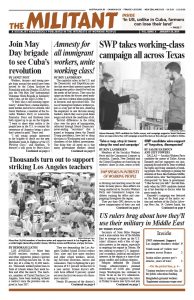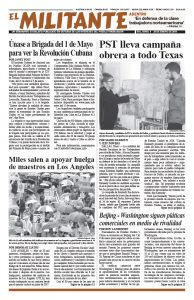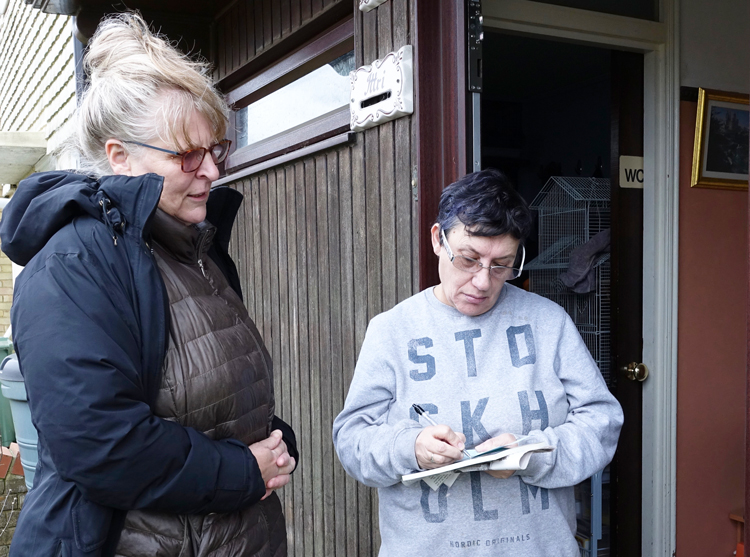Members of the Socialist Workers Party and the Communist Leagues in Australia, Canada, New Zealand and the United Kingdom are knocking on workers’ doors in cities, towns as well as farming and ranching areas far and wide. In many places, these efforts are being reinforced by Socialist Workers Party and Communist League candidates running for office and campaigning throughout the region.
They put their GPS devices in the glove compartment of their cars and instead use maps to follow the roads to town after town to stop and knock on doors. That’s all part of campaigning and learning more about the conditions working people face today.
While campaigning door to door Jan. 13 in an apartment building on the east side of St. Paul, Minnesota, David Rosenfeld, SWP candidate for St. Paul City Council, introduced himself to Nathaniel Rogers. Rogers, an African-American worker, has to balance two jobs to get by — one in health care and the other in the food industry.
They discussed immigration and agreed the government uses this issue to try and divide working people and keep workers down. “I think it would be better for all workers to be legal,” Rogers said, when Rosenfeld explained the SWP campaigns for amnesty for millions of workers here without the documents that U.S. rulers consider proper.
As many workers do at the end of doorstep discussions with SWP members, Rogers asked, “What do you want me to do?” Rosenfeld showed him the books that party members are campaigning with and the latest issue of the Militant newspaper. “The books we encourage people to read are not ‘history books,’” Rosenfeld said. “They are written to help equip us with the lessons of past working-class struggles to prepare to build a movement of millions of working people.
“A movement that can take political power out of the hands of the capitalist rulers and run society in the interests of the vast majority,” he said.
“I’m not much of a reader,” Rogers told Rosenfeld, “but I want some of these.” He got The Clintons’ Anti-Working-Class Record: Why Washington Fears Working People by SWP National Secretary Jack Barnes, and a subscription to the Militant.
In the same area of St. Paul, campaign supporter Terrell Logan met Michael, originally from Liberia, who didn’t want his last name used for job considerations. Michael is waiting to get a job until his work permit is renewed. “Trump’s government is treating us unfairly,” he said. “He is trying to make things tougher.”
“What’s important here is the growing numbers of workers who see immigrants as their fellow workers, neighbors and classmates,” Logan said. “One example was a protest against police raids in O’Neill, a small town in Nebraska, last August, organized by local residents in support of workers rounded up by immigration police,” he said.
Campaign supporters have joined Linda Harris, the Communist League candidate for the seat of Granville in the New South Wales Legislative Assembly, in going door to door. Granville is an electoral district in western Sydney, Australia. The NSW elections are March 23.
On Jan. 13, Harris and supporters knocked on working people’s doors in Dapto, a suburb of Wollongong 60 miles south of Sydney. “I won’t know until March if I still have a job or what hours I’ll be given,” Paul William, a school cleaner, told Harris at his doorstep.
William’s bosses had just lost their government contract. “Permanent workers like me have to reapply for our jobs with the new company that won the contract. The casual workers have been told not to even bother applying; they’ve lost their jobs.”
“The bosses use whatever means they can to drive down workers’ wages and conditions,” said Harris. “We need to organize and rebuild our unions to defend ourselves.” She pointed to an article in the Militant on the yellow vest protesters in France, saying they were an example of the capabilities of working people to fight and make gains.
“I’ve been raising that we need a mass union meeting to discuss what is happening to us. More than 1,000 workers are affected,” William said. He decided to get a subscription to the paper.
Is Socialist Revolution in the US Possible? by SWP leader Mary-Alice Waters and “It’s the Poor Who Face the Savagery of the US ‘Justice’ System”: The Cuban Five Talk About Their Lives Within the US Working Class are two of the books on special with a subscription. They help explain why the Cuban Revolution shows how workers and farmers everywhere have the capacity to unite and make a socialist revolution.
Cuba is the one living example where workers and farmers fought successfully to take political power. And they’ve defended that conquest successfully for the last 60 years.
SWP members are working with others to build the April 21-May 5 International May Day brigade to Cuba. This annual brigade is an opportunity for workers and young people to learn firsthand about the revolution and how it opened the door for a deep-going social transformation.
Readers are urged to keep sending in reports for this column, especially about the political back and forth of their discussions on workers’ doorsteps and their reactions to the books and the Militant, as well as photos, to enrich the paper each week.
To join in or to find out more, contact the SWP or Communist League branch nearest you. (See directory.)


